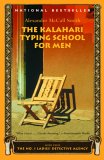Summary | Excerpt | Reading Guide | Reviews | Readalikes | Genres & Themes | Author Bio

More from the No. 1 Ladies' Detective Agency
by Alexander McCall SmithCHAPTER ONE
How to Find a Man
I must remember, thought Mma. Ramotswe, how fortunate I am in this life; at every moment, but especially now, sitting on the verandah of my house in Zebra Drive, and looking up at the high sky of Botswana, so empty that the blue is almost white. Here she was then, Precious Ramotswe, owner of Botswana's only detective agency, The No. 1 Ladies' Detective Agency--an agency which by and large had lived up to its initial promise to provide satisfaction for its clients, although some of them, it must be said, could never be satisfied. And here she was too, somewhere in her late thirties, which as far as she was concerned was the very finest age to be; here she was with the house in Zebra Drive and two orphan children, a boy and a girl, bringing life and chatter into the home. These were blessings with which anybody should be content. With these things in one's life, one might well say that nothing more was needed.
But there was more. Some time ago, Mma. Ramotswe had become engaged to Mr. J.L.B. Matekoni, proprietor of Tlokweng Road Speedy Motors, and by all accounts the finest mechanic in Botswana, a kind man, and a gentle one. Mma. Ramotswe had been married once before, and the experience had been disastrous. Note Mokoti, the smartly dressed jazz trumpeter, might have been a young girl's dream, but he soon turned out to be a wife's nightmare. There had been a daily diet of cruelty, of hurt given out like a ration, and when, after her fretful pregnancy, their tiny, premature baby had died in her arms, so few hours after it had struggled into life, Note had been off drinking in a shebeen somewhere. He had not even come to say good-bye to the little scrap of humanity that had meant so much to her and so little to him. When at last she left Note, Mma. Ramotswe would never forget how her father, Obed Ramotswe, whom even today she called the Daddy, had welcomed her back and had said nothing about her husband, not once saying I knew this would happen. And from that time she had decided that she would never again marry unless--and this was surely impossible--she met a man who could live up to the memory of the late Daddy, that fine man whom everybody respected for his knowledge of cattle and for his understanding of the old Botswana ways.
Naturally there had been offers. Her old friend Hector Mapondise had regularly asked her to marry him, and although she had just as regularly declined, he had always taken her refusals in good spirit, as befitted a man of his status (he was a cousin of a prominent chief). He would have made a perfectly good husband, but the problem was that he was rather dull and, try as she might, Mma. Ramotswe could scarcely prevent herself from nodding off in his company. It would be very difficult being married to him; a somnolent experience, in fact, and Mma. Ramotswe enjoyed life too much to want to sleep through it. Whenever she saw Hector Mapondise driving past in his large green car, or walking to the post office to collect his mail, she remembered the occasion on which he had taken her to lunch at the President Hotel and she had fallen asleep at the table, halfway through the meal. It had given a new meaning, she reflected, to the expression sleeping with a man. She had woken, slumped back in her chair, to see him staring at her with his slightly rheumy eyes, still talking in his low voice about some difficulty he was having with one of the machines at his factory.
"Corrugated iron is not easy to handle," he was saying. "You need very special machines to push the iron into that shape. Do you know that, Mma. Ramotswe? Do you know why corrugated iron is the shape it is?"
Mma. Ramotswe had not thought about this. Corrugated iron was widely used for roofing: was it, then, something to do with providing ridges for the rain to run off? But why would that be necessary in a dry country like Botswana? There must be some other reason, she imagined, although it was not immediately apparent to her. The thought of it, however, made her feel drowsy again, and she struggled to keep her eyes open.
Excerpted from The Kalahari Typing School for Men by Alexander McCall Smith Copyright© 2003 by Alexander McCall Smith. Excerpted by permission of Pantheon, a division of Random House, Inc. All rights reserved. No part of this excerpt may be reproduced or reprinted without permission in writing from the publisher.




Dictators ride to and fro on tigers from which they dare not dismount. And the tigers are getting hungry.
Click Here to find out who said this, as well as discovering other famous literary quotes!
Your guide toexceptional books
BookBrowse seeks out and recommends the best in contemporary fiction and nonfiction—books that not only engage and entertain but also deepen our understanding of ourselves and the world around us.